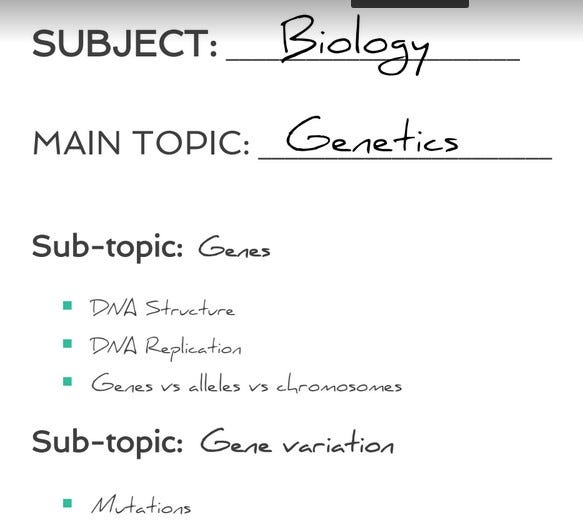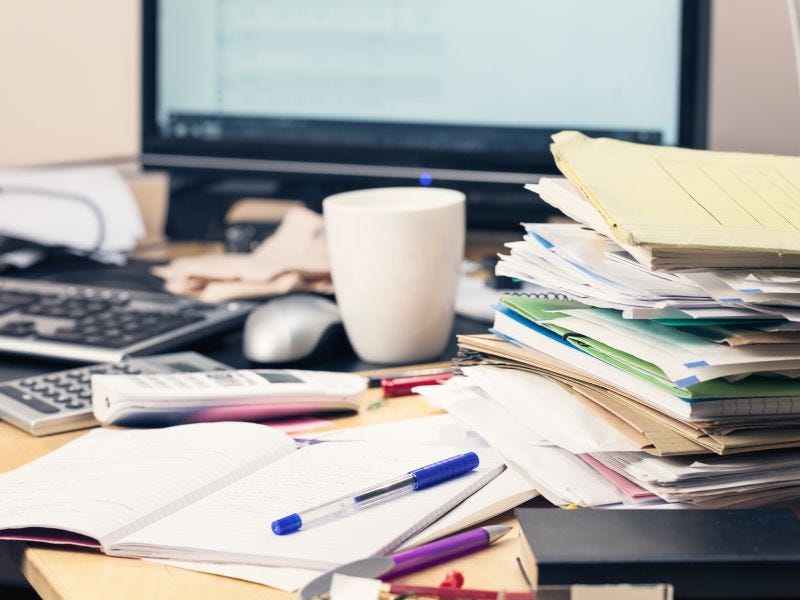Goodbye Stress: How to help your teen get organised and stop feeling overwhelmed
Three practical tips for helping your teen get into a 'positive feedback loop' of studying productivity.
When teens are studying, or attempting to study, they’ll find themselves in either a positive or negative feedback loop.
Your teen is probably pretty well acquainted with the negative feedback loop, which looks something like this:
Tries to start studying —> doesn’t know where to start —> doesn’t know what to do —> feels overwhelmed / gets bored / frustrated —> loses motivation —> no productive output.
This type of negative feedback loop is so demoralising for everyone, because it feels like you’ve failed before you’ve even started.
And it breeds a feeling of overwhelm and sucks any ounce of motivation your teen might have.
What we want, is to get your teen studying in such a way that puts them into a positive feedback loop. A loop that looks something like this:
Has a plan for studying —> more organised —> more productive —> more motivation —> better results —> less stress —> better focus —> more productive —> better results.
So how can you help your teen study in a way that produces a positive feedback loop?
Below are three really practical study skills you can help your teen implement that will get them organised and motivated, which is the kindling they need to start studying productively.
1. Subject Maps
When I was at high school, I didn’t realise it at the time, but I implemented a method for getting organised at the beginning of my exam study that set me up for really efficient studying.
I have come to call this l’il invention, a Subject Map.
A Subject Map is simply a document that breaks down each subject into manageable parts:
Subject
Main Topics
Sub-topics
Main points
Here is one of my examples for high school Biology (for around Year 11 / GCSE / Freshman-Sophomore level):
I would make Subject Maps before I launched into my substantive exam study (about 6 weeks - 2 months out from exams).
And here’s why I love them so much and highly recommend your teen starts making them too.
This incredibly simple document achieved so many things:
Made me think about what the important topics were to study (rather than peripheral topics that were unlikely to come up or yield many marks);
Made me figure out the logical order for studying each topic;
Points 1 and 2 gave me an instant study plan which I could plug into an Exam Study Timetable, AND
Because of points 1-3, all of this was an enormous help for my stress levels. Knowing what I needed to study and seeing it written down took all of that stressful information out of my head.
The key for making Subject Maps really effective is to make sure they focus on what I call key topics — the topics that are most likely to come up in the exam and make up the majority of available marks.
Teens can fall into the trap of wasting precious study time and energy studying peripheral topics that aren’t worth much attention.
2. Study environment
Ya know the saying with babies that sleep begets sleep?
Well studying is very similar. Getting into good study habits and a study routine makes studying in general so much less painful.
And a really important aspect of getting into good study habits is having a study environment that works for your teen.
At first glance this is the type of study tip that comes up again and again in every generic study advice article, but I’m mentioning it because it is important and I have a very important caveat to add —
Your teen’s study environment needs to work for THEM. Not their friends. Not Instagram.
Notice I’ve said study environment rather than study desk?
Your teen might like studying at a desk, but maybe not! I know that some teens can smash out productive studying while spread over the lounge floor.
Absolutely everything I talk about on Cram Lab is about helping your teen figure out works for THEM. That is the ultimate key to effective studying, and that includes where your teen studies.
Your teen might have more than one study space — some days they might want to sit at a desk in their room, other days the kitchen table, other days the lounge floor. Other teens might only be able to find their focus in one very specific place.
No two Study Systems will work exactly the same. The key is just to be mindful about what is working, and what’s not.
This is how your teen will find their positive feedback loop.
3. Having a place for everything
This is one of my favourite organisation hacks.
I guess it’s the same as that saying — a place for everything and everything in its place.
I’m not naturally that tidy. I have forced myself to be tidier, particularly since having kids.
So when I heard this tip many years ago I latched on and it’s saved me so many hours in stress and stuffing around looking for stuff that I can’t find.
I love it because it’s so simple. So simple that any teen can make use of it.
To save your teen tonnes of time and stress, this is what I want them to do with their school and study stuff:
Bits of paper from school (if they ever use actual paper) — filed when they get home in a designated folder, rather than scrumpled up in their bag for three weeks.
Electronic files — need their own folder within a well organised folder system.
Study notes — for digital ones, in a digital note taking app like OneNote or Evernote like I talked about last week.
Analogue study notes — one exercise book per subject. No more loose bits of paper.
Stationery — in a drawer.
The idea is that everything has a place, but not only that — I want your teen to start developing the habit of putting things away straight away, rather than putting them down haphazardly somewhere.
This saves a doubling up of putting stuff away, because everything is put away in the right place first time.
I hope your teen gets as much out of these organisation tips as I did.
I love them because they are incredibly simple, and things that any teen can do, but not at the expense of being effective — not only do they help with organisation, they have massive spinoff benefits.
It goes back to that positive feedback loop.
Organisation —> productivity —> motivation —> productivity —> results —> less stress better focus —> motivation —> productivity —> results —> less stress.
Thanks so much for reading.
Clare
P.S. Where in the negative feedback loop is your teen getting stuck? What’s the main obstacle preventing them from productive study? Let’s talk it out in the comments.
P.P.S. If you haven’t already you can download my free Subject Map Template and Exam Study Timetable Template for your teen from cramlab.org/free-downloads.
.







